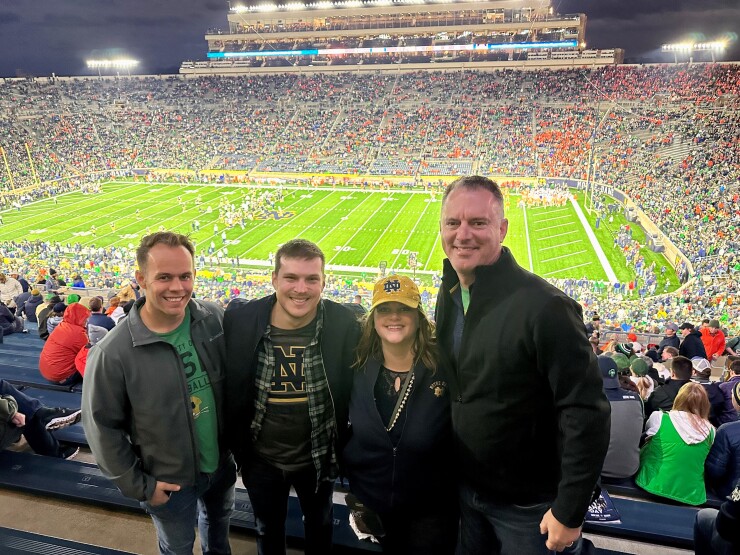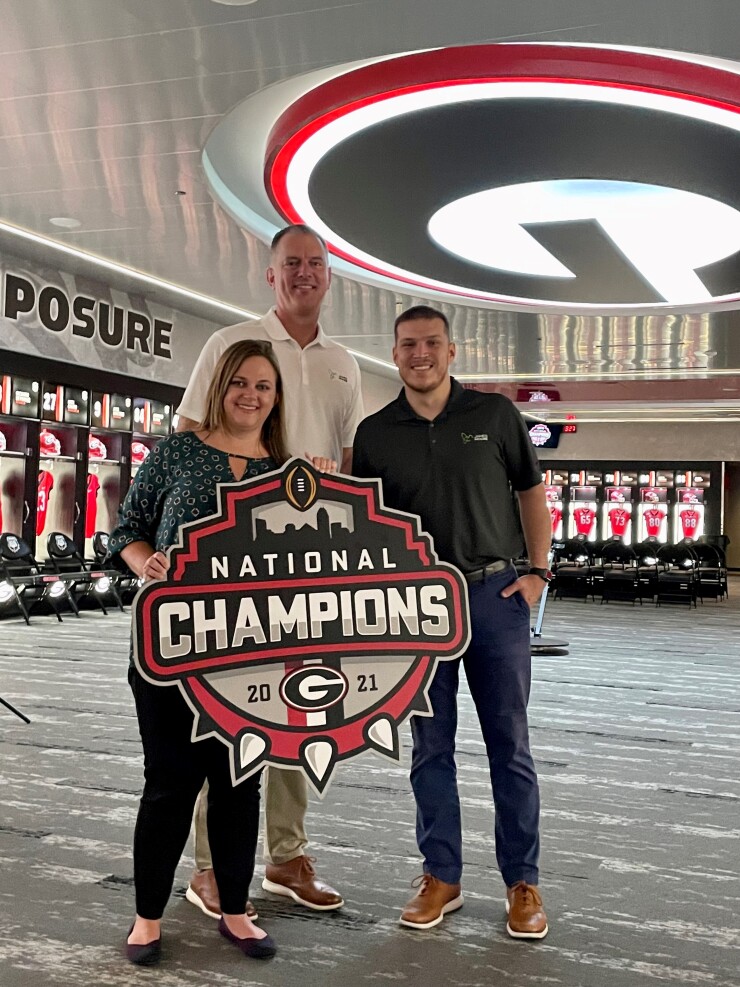As millions of Americans turn on their TVs on a fall Saturday or March weekend to root for their teams in a college football matchup or NCAA basketball tournament berth, Katie Davis is often also tuning in to catch her clients competing — sometimes against each other.
As a partner at Gainesville, Florida-based James Moore & Co. and leader of its collegiate athletics practice, Davis and her team assist athletics departments at some of the biggest universities as they adapt to new regulations and the scrutiny that comes with their massive budgets, revenue streams and viewership. James Moore provides a suite of services to these schools, all members of the National Collegiate Athletic Association and mostly Division 1, including audits, tax planning and education, data analytics and business intelligence, and a host of other industry-specific advisory services.

The unifying goal of all this work, Davis explained, is increasing the proficiency and awareness of these entities' finances, not only for the schools' stakeholders, donors and alumni, but also the media and general public keeping a close eye on these high-profile institutions. The collegiate athletics practice also helps close the loop between the finance and governance functions within these departments.
"From an opportunity standpoint, we are so ingrained in the niche that we understand, and can help advise, based on the situation, how to better tell their financial story — to tie the strategic plan to KPIs, to help better position the financial team that supports the college athletics department in the decision-making process. And they can communicate that to the media, put something out to donors, alumni and … the internal stakeholders driving the decision-making. We can help them state an accurate business case internally, and provide a better narrative for financial reporting so that the CFO is having a seat at the table when the decisions are being made, as opposed to after the fact."
Changing the playbook
James Moore began working in the higher education space in the 1970s, though in the early 2000s the firm became more focused on its growth in the area, expanding out to other higher education-related entities, like athletics departments, in Florida. Over the last 10 years, the practice has expanded nationally and now serves roughly 30 collegiate athletics clients, including athletic departments, associations and booster clubs. Davis, who has been with the firm for over 18 years, leads a team of 10 to 15 people who are well-trained on the NCAA agreed-upon procedures and other unique aspects of the industry. One of these is the financial reporting framework, which she describes as "pretty strongly in the public spotlight."
"People's interest in the college sports business is behind that," she shared. "Significant dollars flow through. The challenge is the financial reporting framework alone does not depict the true picture of the finances because it's not GAAP. There's not an opportunity in the report when it gets filed to provide a lot of narrative context around the numbers. So journalists in particular pick up the information and other people might see it in the community, and campus leadership, and they might not understand what is really happening … . It's pretty out in the open, and there's a dynamic and blowback because of that."
James Moore's role is to provide that context, Davis explained, not only regarding these reports, but some of the major financial deals made by these universities, which have escalated dramatically over the last decade, including everything from switching membership in athletic conferences to to blockbuster coaching contracts.
"In college athletics, different from other industries, the CFO is not really tied to the CEO, so to speak, when making big decisions," Davis said. "They are sometimes, but it's different than in corporate settings, where the CFO and CEO are tied at the hip. That's not really the case in college athletics, where decisions are made without complete financial context or with other nonfinancial pressures."

Another recent, huge shift in the industry was the NCAA rule change in July 2021 permitting student-athletes to be compensated for their name, image and likeness, meaning they can now earn money for commercial endorsements and activities. Davis' team provides education to student-athletes and their advisors on the tax implications of NIL compensation, while also staying ahead of the implications this newer policy will have down the line, including "competition for finite financial resources, donors and sponsors, creating a ripple effect," Davis said, "It's still too early to tell what it will mean for the industry, but there will be a lot of pressure."
Making the team
As athletic departments across the country contend with these seismic industry shifts, Davis shared that for all the intense competition between schools, there is a surprising amount of sharing best practices. "The industry has a very tight network of people. They might be rivals on the field, but behind the scenes they are very close, and collaborate with each other a lot. There's a lot of movement in the industry — people start at one university and work their way up."
On the part of the staff of the James Moore collegiate athletics practice, Davis reports an enthusiasm that matches the national fervor for sports. "There's good retention in the industry; they really like it," she said. "That's partly due to the programs being in the public spotlight — America loves college football, college sports."
And her team loves the perks.
"When we go on campus, we get to see and do a lot of things, we get to go to the games and on behind-the-scenes tours," Davis shared. "[In late November,] we were the private guests for the football practice at a large university's successful football team. It's fun to see the clients in action. Every Saturday during football season, we get 20-something clients playing football, or across all sports."
But who does Davis root for when clients face off?
"We usually cheer for the home team," she said, "but we're cheering for both sides. The home team that is hosting, we wear their gear and will cheer louder."
With so many changes in the collegiate athletics space, Davis has become an expert voice on these evolving models and regulations, sharing her thoughts in articles, on social media, and on James Moore's weekly "News & Brews Sports Biz" podcast, which covers these industry updates and advocates for financial voices in college athletics.
She also keeps an eye toward the horizon. "It's hard to predict a lot — nothing is guaranteed," she acknowledged. "The industry is shifting more to guaranteed-revenue models with media contracts, ticket sales, and new media contracts." Other changes she's helping clients navigate include "conference realignment, we see a lot more of that; the decision that the college football playoffs will be expanding [starting in the 2024-25 season]; more interest in college football and all the media revenue it generates; all the money that goes toward coaching; the huge push by some for athletes to be compensated … there is no pay for play [in recruiting student-athletes] right now."
"The discussion is out there, on the national level, from people in the Department of Labor and other areas — should athletes be employees, and if so, which athletes?" she added. "That changes the entire business model."
As for now, Davis leads the practice in its galvanizing mission to help these schools understand and communicate their finances. "Our goal is to bring a lot of awareness to the flaws in the financial reporting model, and the fact that there needs to be more of a narrative to put color around the numbers. It's even more important with the rapidly evolving industry, needing to have better real-time context of the financial position so we can understand the recourse needed and the implications of the decisions being made."





